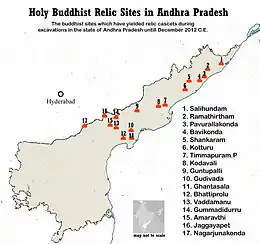Bhattiprolu
Bhattiprolu is a village in Guntur district of the Indian state of Andhra Pradesh. It is the headquarters of Bhattiprolu mandal in Tenali revenue division.[4] The Buddhist stupa in the village is one of the centrally protected monuments of national importance.[5] One of the earliest evidence of Brahmi script in South India comes from Bhattiprolu.[6] The script was written on an urn containing Buddha's relics. The script has been named Bhattiprolu script
Bhattiprolu | |
|---|---|
Village | |
 Buddhist Maha Stupa at Bhattiprolu | |
.svg.png.webp) Bhattiprolu Location in Andhra Pradesh, India | |
| Coordinates: 16.1026°N 80.7807°E | |
| Country | India |
| State | Andhra Pradesh |
| District | Guntur |
| Mandal | Bhattiprolu |
| Government | |
| • Type | Panchayati raj |
| • Body | Bhattiprolu Gram Panchayat |
| Area | |
| • Total | 2,515 ha (6,215 acres) |
| Population (2011)[3] | |
| • Total | 11,092 |
| • Density | 440/km2 (1,100/sq mi) |
| Languages | |
| • Official | Telugu |
| Time zone | UTC+5:30 (IST) |
| PIN | 522xxx |
| Area code(s) | +91– |
| Vehicle registration | AP |

History
The original name of Bhattiprolu was Pratipalapura, a flourishing Buddhist town in the ancient Sala kingdom that predated Andhra Satavahanas. From available inscriptional evidence, King Kuberaka was ruling over Bhattiprolu around 230 BCE. Bhattiprolu is well known for its Buddha stupa (Vikramarka kota dibba) built about 3rd-2nd century BCE.
The stupa and the script
Three mounds were discovered in Bhattiprolu in 1870. In 1892 when excavations were undertaken by Alexander Rea, three inscribed stone relic caskets containing crystal caskets, relics of Buddha and jewels were found.[7] The stupa was found to be 40 meters in diameter with an additional basement of 2.4 meters wide running all around. The most significant discovery is the crystal relic casket of Sarira Dhatu of the Buddha from the central mass of the stupas. The Mahachaitya (great stupa) remains of a large pillared hall, a large group of ruined votive stupas with several images of Buddha, a stone receptacle containing copper vessel, which in turn, contained two more, a silver casket and within it, a gold casket enclosing beads of bone and crystal were found.
One of the earliest evidence of Brahmi script in South India comes from Bhattiprolu.[6] The script was written on an urn containing Buddha's relics. The script has been named Bhattiprolu script.
The Bhattiprolu script is related to the Tamil-Brahmi, and is found in nine early inscriptions on stupa relic caskets discovered at Bhattiprolu (Andhra Pradesh). According to Richard Salomon, the Bhattiprolu script reflects innovations in a Dravidian language context, rather than Indo-Aryan languages. Both the Bhattiprolu and Tamil Brahmi share common modifications to represent Dravidian languages. The Bhattiprolu was likely a provincial offshoot of early southern Brahmi script, states Salomon.
"A Manual of the Krishna District in the Presidency of Madras" (1883) mentions Public Works Department at that time having demolished beautiful marble pillars, central casket and used the remains in the sluice flowing 2 miles east of Bhattiprolu.[8] Bhattiprolu Union Panchayat was established in 1892 under Madras local boards act.[9]
Geography
Bellamkonda is situated to the southeast of the mandal headquarters, Amaravathi,[4] at 16.1026°N 80.7808°E. It is spread over an area of 2,515 ha (6,210 acres).[2]
Government and politics
Bhattiprolu gram panchayat is the local self-government of the village.[10][11] The village forms a part of Andhra Pradesh Capital Region and is under the jurisdiction of APCRDA.[12]
Transport
The village has connectivity with National Highway 214A which passes through the village. APSRTC operates buses from Tenali and Repalle via Bhattiprolu. Bhattiprolu railway station is located on Tenali–Repalle branch line and administered under Guntur railway division of South Central Railway zone.[13]
Education
As per the school information report for the academic year 2018–19, the village has a total of 14 schools. These include 4 MPP, one other type and 9 private schools.[14]
References
- "Gram Panchayat Identification Codes" (PDF). Saakshar Bharat Mission. National Informatics Centre. p. 98. Archived from the original (PDF) on 18 August 2017. Retrieved 9 May 2019.
- "District Census Hand Book : Guntur (Part B)" (PDF). Census of India. Directorate of Census Operations, Andhra Pradesh. 2011. pp. 14, 474. Retrieved 2 June 2019.
- "Population". Census of India. Registrar General and Census Commissioner of India. Retrieved 9 May 2019.
- "District Census Handbook : Guntur (Part A)" (PDF). Census of India. Directorate of Census Operations, Andhra Pradesh. 2011. pp. 5, 782–783. Retrieved 3 June 2019.
- "Centrally Protected Monuments". Archeological Survey of India. Archived from the original on 26 June 2017. Retrieved 27 May 2017.
- Ananda Buddha Vihara Archived 2007-09-30 at the Wayback Machine
- Sajnani, Manohar (2001). Encyclopaedia of tourism resources in India. New Delhi: Kalpaz Pub. p. 66. ISBN 978-81-7835-018-9. Retrieved 26 November 2015.
- Mackenzie, Gordon (1 January 1883). A Manual of the Kistna District in the Presidency of Madras. Asian Educational Services. ISBN 9788120605442.
- "Notification 1306". Fort St George Gazette. 1915.
- "Gram Panchayat Identification Codes" (PDF). Saakshar Bharat Mission. p. 97. Archived from the original (PDF) on 5 July 2016. Retrieved 5 July 2016.
- "Bhattiprolu Village Panchayat". National Panchayat Portal. Retrieved 6 May 2016.
- "Declaration of A.P. Capital Region" (PDF). Andhra Pradesh Capital Region Development Authority. Municipal Administration and Urban Development Department, Andhra Pradesh. 30 December 2014. p. 5. Archived from the original (PDF) on 11 May 2019. Retrieved 14 May 2019.
- "Map of Bhattiprolu". Indiarailinfo. Retrieved 12 December 2014.
- "School Information". Commissionerate of School Education. Government of Andhra Pradesh. Retrieved 7 May 2019.